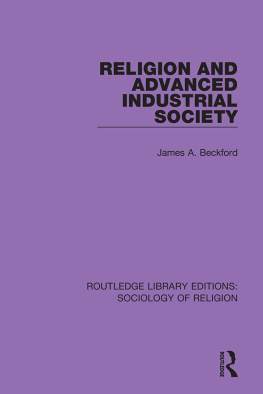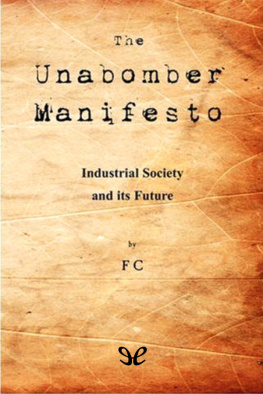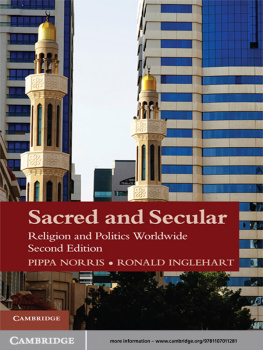ROUTLEDGE LIBRARY EDITIONS: SOCIOLOGY OF RELIGION
Volume 9
RELIGION AND ADVANCED INDUSTRIAL SOCIETY
RELIGION AND ADVANCED INDUSTRIAL SOCIETY
JAMES A. BECKFORD
First published in 1989 by Unwin Hyman Ltd
This edition first published in 2019
by Routledge
2 Park Square, Milton Park, Abingdon, Oxon OX14 4RN
and by Routledge
52 Vanderbilt Avenue, New York, NY 10017
Routledge is an imprint of the Taylor & Francis Group, an informa business
1989 J.A. Beckford
All rights reserved. No part of this book may be reprinted or reproduced or utilised in any form or by any electronic, mechanical, or other means, now known or hereafter invented, including photocopying and recording, or in any information storage or retrieval system, without permission in writing from the publishers.
Trademark notice: Product or corporate names may be trademarks or registered trademarks, and are used only for identification and explanation without intent to infringe.
British Library Cataloguing in Publication Data
A catalogue record for this book is available from the British Library
ISBN: 978-0-367-02386-7 (Set)
ISBN: 978-0-429-02545-7 (Set) (ebk)
ISBN: 978-0-367-02465-9 (Volume 9) (hbk)
ISBN: 978-0-367-02466-6 (Volume 9) (pbk)
ISBN: 978-0-429-39943-5 (Volume 9) (ebk)
Publishers Note
The publisher has gone to great lengths to ensure the quality of this reprint but points out that some imperfections in the original copies may be apparent.
Disclaimer
The publisher has made every effort to trace copyright holders and would welcome correspondence from those they have been unable to trace.
Religion and Advanced Industrial Society
JAMES A. BECKFORD
First published 1989 by Unwin Hyman Ltd
Reprinted in 1992
by Routledge
11 New Fetter Lane, London EC4P 4EE
Simultaneously published in the USA and Canada
by Routledge
a division of Routledge, Chapman and Hall Inc.
29 West 35th Street, New York, NY 10001
J. A. Beckford 1989
Printed and bound in Great Britain by
Billings & Sons Limited, Worcester
All rights reserved. No part of this book may be reprinted or reproduced or utilized in any form or by any electronic, mechanical, or other means, now known or hereafter invented, including photocopying and recording, or in any information storage or retrieval system, without permission in writing from the publishers.
British Library Cataloguing in Publication Data
Beckford, James A. (James Arthur), 1942
Religion and advanced industrial society. -
(Controversies in sociology)
I. Society. Role of religion
I. Title II. Series
306.6
Library of Congress Cataloging-in-Publication Data
Beckford, James A.
Religion and advanced industrial society/James A. Beckford.
p. cm.
Bibliography: p.
Includes index.
1. Religion and sociology. 2. Knowledge, Sociology of.
3. Civilization, Modem. I. Title.
BL60.B33 1989 89-32418
306.6dc20 CIP
ISBN 0-415-08462-8
For my mother
The modem sociology of religion is remarkably self-contained. It has its own concepts, theories and general problematics. It also flourishes in some places as an area for empirical research. But its links with other fields of sociology are, at best, tenuous. As a result, it is rare for studies of religion to be based on, or to influence, broad ideas about the dynamics and problems of todays societies. The main aim of this book is to show how the estrangement between the sociology of religion and other fields of sociology has taken place and what its consequences are for sociological studies of religion.
This book is not an exhaustive compilation of theoretical ideas or empirical findings. Nor is it an account of the state of religion in the late twentieth century. Rather, it analyses the main theoretical currents within which sociological research on religion has been conducted. And it argues that the failure to take the changing character of industrial and advanced industrial societies into account has tended to obscure the fact that, as an object of methodical study, religion remains a puzzling phenomenon - not, however, for the reasons given by many sociologists of religion. For it is not my intention merely to add to the swelling chorus of claims that religion is alive and well in supposedly secular societies. My point is different: it is that modern religion presents sociologists with theoretical problems. It challenges many taken-for-granted assumptions about their models of modernity. Religion also represents a challenge to social order in some places and continues to be controversial in many respects.
The central message of this book is that attempts to make sociological sense of present-day religion should take account of theoretical ideas about the distinctiveness of advanced industrial societies and the emerging world order. This necessarily involves a serious consideration of the ways in which ideas about the social significance of religion have changed over time. The pattern that emerges is one of continuity within change. It is questionable, however, whether sociologists of religion have been fully aware of the extent to which their ideas have been grounded in broad theories about industrial society. This book is offered in the hope that a stronger appreciation of these underlying theoretical ideas will lead to a more critical attitude towards them and a greater readiness to modify them in the light of findings from research on advanced industrial or post-industrial societies. Only in this way, I contend, can the sociological study of religion begin to regain the central position that it once occupied in sociology. If this can be achieved, the sociology of the modern world will be considerably enhanced.
INTRODUCTION
The central argument of this book is that the contours of the sociology of religion have been shaped by specific ideas about industrial society. The sociological questions that have been asked about religion have therefore tended to reflect these ideas. I shall argue that the various meanings and different degrees of importance that have been attributed to such phenomena as secularization, rationalization and the rise of new religious movements are outcrops of underlying ideas about the transition from pre-industrial to industrial society. I intend to criticize these underlying, but rarely examined, ideas.
My main contention is that the legacy of classical sociologists is so coloured by assumptions about the nature of industrial society that attempts to explain the character of religion in a world dominated by advanced industrial societies have been hindered. Contrary to much received wisdom and to common sense, I shall argue that religion remains highly problematic for the sociology of advanced industrial societies.
The present chapter will define some of the terms which are important for my general argument and will then chart, first, the process whereby the sociological study of religion moved from the centre to the periphery of sociology; secondly, the broad changes in twentieth century religion which have taxed the explanatory capacity of the sociology of religion; and, thirdly, the factors which have insulated the sociology of religion against, and isolated it from, the influence of wider intellectual debates. The legacy of classical sociology is shown in examines the evidence of a renewed interest in religion as a sociological problem among some Marxists and quasi-Marxists.











